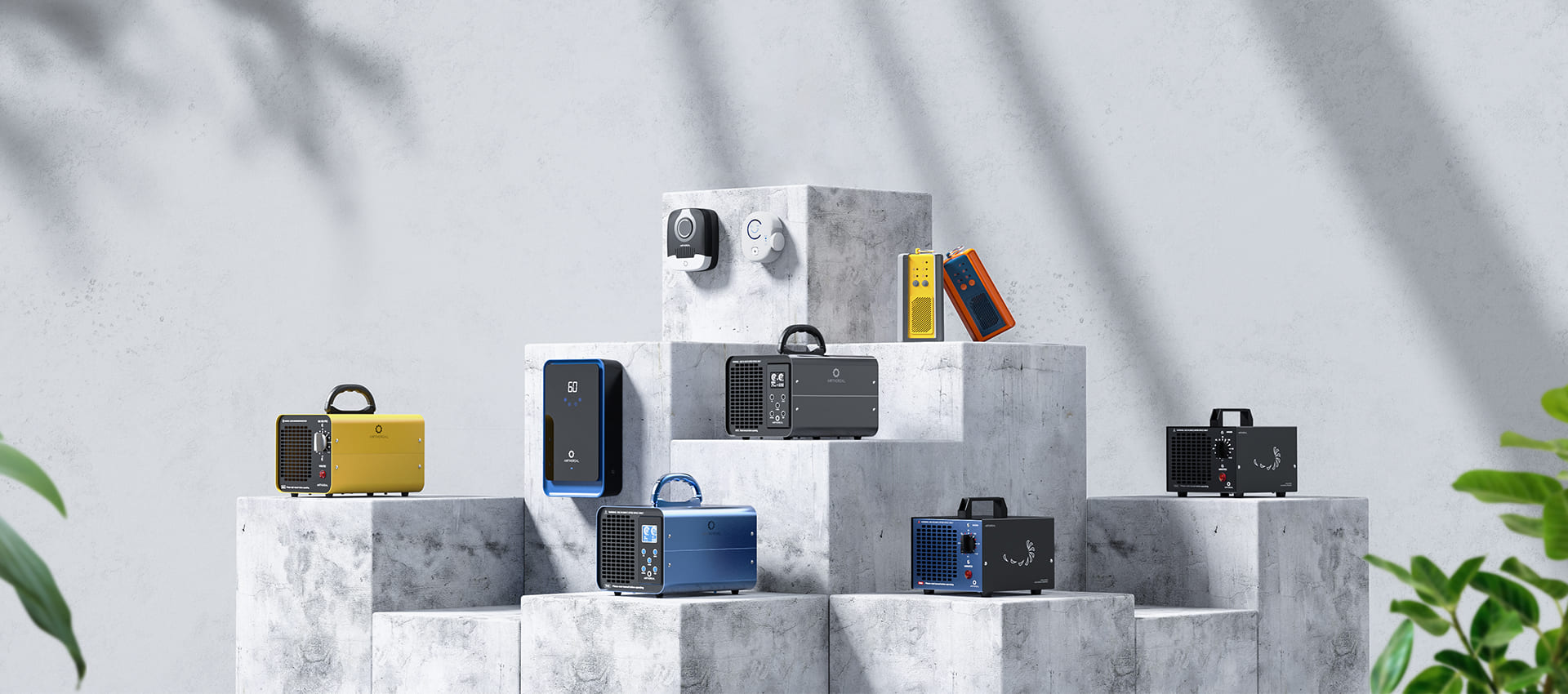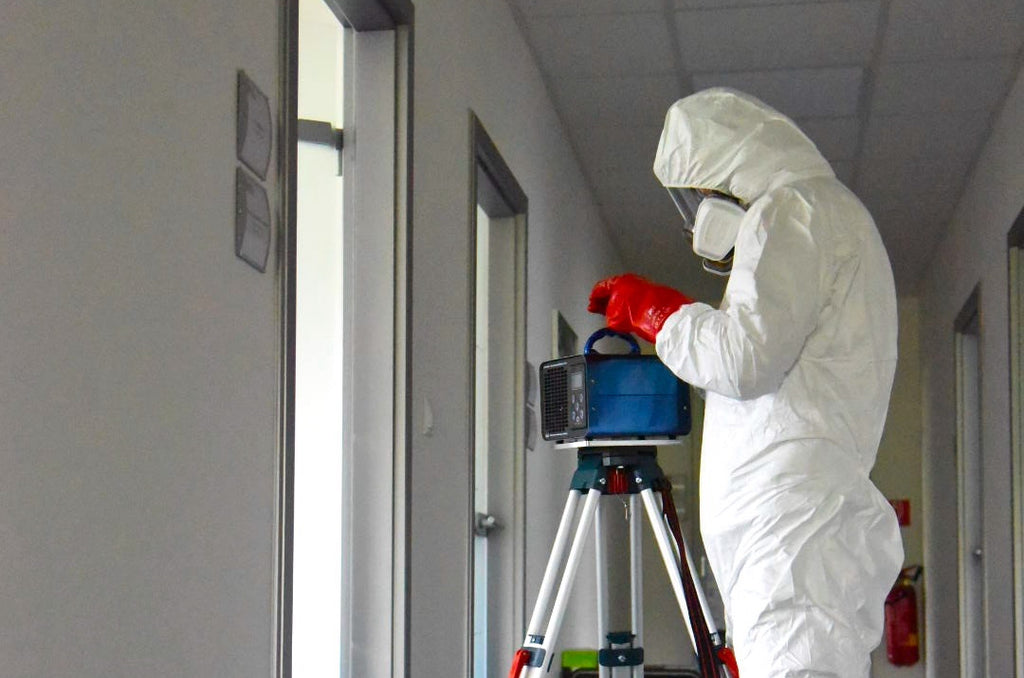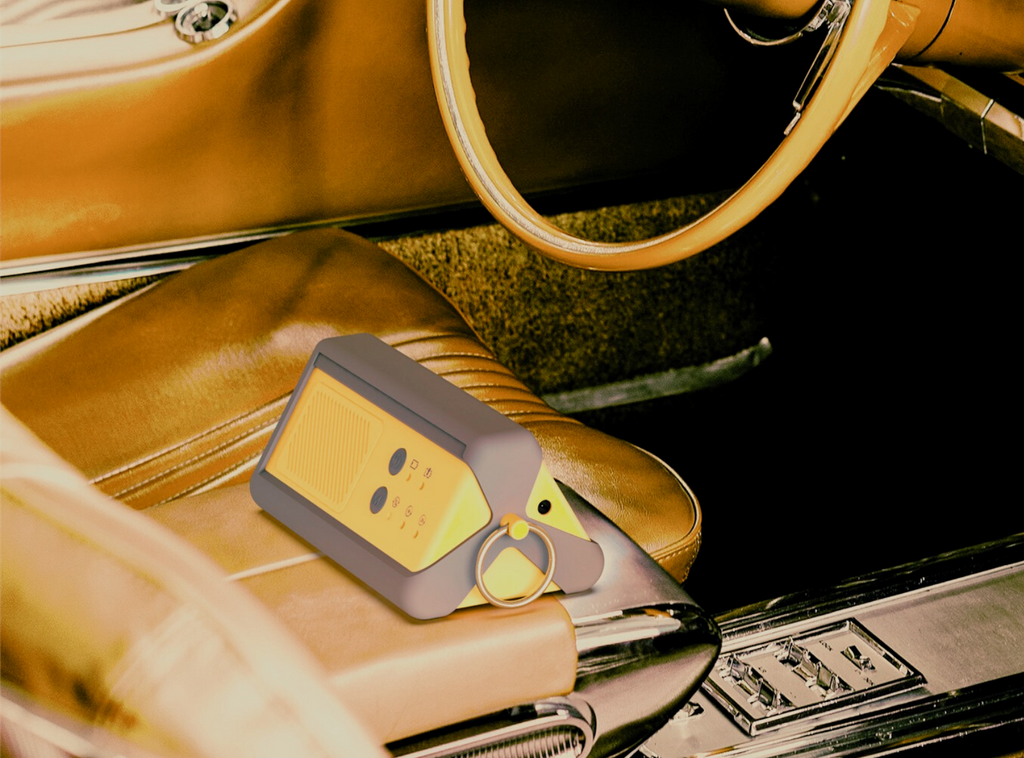
[Updated July 29, 2022]
Since 2020, Airthereal ozone generator units have been selling out as businesses, medical facilities, transportation services and more are eager to deep clean and disinfect their spaces. Ozone generators can assist with sterilization of surfaces and the removal of odors, viruses, bacteria and other contaminants.
In this post, we address the many questions and concerns customers have had when using an ozone generator during a time where respiratory illnesses have been on the rise.
General Use FAQs

Q: What is ozone and how exactly does an ozone generator work?
A: Ozone (O3) is a powerful sterilizer. When odors, bacteria, viruses or molds meet ozone, oxidation reactions occur and both parties are destroyed. Ozone then reverts back to oxygen. Therefore, even though exposure to high concentrations of ozone can be harmful to humans and pets, it won’t last long in the air.
Remember to open doors or windows to allow ventilation for at least 30 minutes after use or turn on the air conditioning during the treatment if you use it in the basement. It can sterilize your AC system as well.
Note: Ozone can adversely affect indoor plants and damage materials like rubber, electrical wire coatings, fabrics and artwork containing susceptible dyes and pigments. Since the main reaction of ozone is strong oxidation, during the oxidation certain polymer groups may have some negative effects, such as PU plastics oxidizing and turning yellow.
Q: How do I go about using ozone generators in my cleaning or disinfection process?
A: Step 1 - Clean up first: Before ozone treatments, please do some cleaning in order to remove the source of the odors. Close the windows and doors. Make sure no people, plants or pets are in the room.
Step 2 - Use the timer: It's highly recommended to set the timer and leave it in the room. Treatment time can be adjusted according to room size and air quality. If you aren’t sure, you can start with 15 min and increase the treatment duration or frequency next time.
Step 3 - Use in Unoccupied space ONLY: Exposure to high concentrations of ozone can be harmful. Please stay outside the room being treated with ozone. We include a NO ENTRY sign in the package as a gift, which can be hung outside the door.
Step 4 - Repeat ozone treatments (as needed): You can take out your ozone generator and schedule an ozone treatment whenever necessary. Repeat the previous steps.
Ozone Treatment Guide*
|
SPACE |
COVERAGE |
FREQUENCY |
||
|
Car |
50 ft² / 5 m² |
4 min |
2 min |
Once a week |
|
Bathroom |
100 ft² / 10 m² |
7 min |
5 min |
Twice a week |
|
Kitchen/Laundry |
200 ft² / 20 m² |
15 min |
10 min |
Twice a week |
|
Bedroom/Office |
300 ft² / 30 m² |
30 min |
15 min |
Once a week |
|
Living Room |
500 ft² / 50 m² |
45 min |
30 min |
Once a week |
|
Garage |
600 ft² / 60 m² |
60 min |
40 min |
Twice a week |
| SPACE | COVERAGE | MA10K-PRODIGI | MA10K-PRO Smart | FREQUENCY |
|
Car Kitchen Bedroom |
0-200 sq. ft. |
2 g/h 1 hour |
2 g/h 1 hour |
Once a week |
|
Boat Garage Basement |
200-500 sq. ft. |
4 g/h 1 hour |
4 g/h 1 hour |
Once a week |
|
Living room Office Bar |
500-1,000 sq. ft. |
6 g/h 2 hours |
6 g/h 2 hours |
Once a week |
|
Pet Clinic Dining hall |
1,000-2,000 sq. ft. |
8 g/h 2 hours |
8 g/h 2 hours |
Once a week |
|
Farm Supermarket |
2,000+ sq. ft. |
10 g/h 2 hours |
10 g/h 2 hours |
Once a week |
*For reference only. Other variables may factor in the length of ozone treatments per space. For specifics on units by space, please see our ozone generator buying guide.
|
Power |
Battery |
AC 110V |
AC 110V |
AC 110V |
AC 110V |
AC 110V |
|
For Areas of |
500 sq. ft. |
For Water |
2,000 sq. ft |
2,000+ sq. ft |
2,000+ sq. ft |
2,000+ sq. ft |
|
Ozone Output |
1,000 mg/h |
1,000 mg/h |
5,000 mg/h |
10,000mg/h |
2,000-10,000mg/h |
2,000-10,000mg/h |
|
Timer |
2 hours |
1 hours |
2 hours |
2 hours |
12 hours |
12 hours |
|
Wi-Fi Control |
- |
- |
- |
- |
- |
✓ |
|
Cycle Mode |
✓ |
- |
- |
- |
✓ |
✓ |
|
Adjustable Ozone Output |
- |
- |
- |
- |
✓ |
✓ |
|
Adjustable Fan Speed |
- |
- |
- |
- |
✓ |
✓ |
|
LCD Display |
- |
✓ |
- |
- |
✓ |
✓ |

Q: Will the unit help with mold reduction?
A: If the mold in question is out in the open, (visible on surfaces) the ozone generator will kill the visible mold on surfaces as well as spores in the air. After repeated uses of the ozone unit, mold will change color, (gray to white) and you can then clean it off with bleach.
If mold is behind your walls or underneath surfaces, it won’t be exposed to enough ozone to eliminate it. So you would have to remove the non-visible mold in order to eliminate it permanently from your space.
If you can’t easily remove non-visible mold, you will need to use ozone periodically to kill the spores in the air as they form. That should prevent mold from growing elsewhere. If your house is very humid or damp, mold will likely form regularly. In that case, use ozone regularly to kill the spores in the air.
Q: How long do the ozone generator plates last?
A: With proper maintenance, the ozone plate is meant to be used for years (between 5,000 and 20,000 hours of run time). Only change the plate when the blue light is weaker and dimmer than usual and you can’t smell as much ozone as before, post-use. Clean or change the ozone plates if the ozone output is weak. Environmental factors affect the duration of ozone output. Keep the unit in a cool, dry space when in storage.

Q: Can I set my ozone generator to run while I’m gone?
A: Rooms MUST be unoccupied when the ozone generator is on and running. Our units come with helpful, user-friendly timers (some with dials, some without). Timer function can be set up to 120 minutes and you can also use “HOLD” mode to keep it on. Set the timer before you leave the room, ensure that no people or pets are in the room when the ozone machine is working. Treatment times are approximately 10 minutes to 60 minutes depending on the size of space.
With our Smart Ozone Generator with App Control via WiFi, it's now easier to manage and control ozone output from outside the home or office, so you don't have to risk exposure.
Q: Once I have my ozone generator, how do I maintain it and keep it in its best condition?
A: Maintenance is super easy, actually!
1. Take out and wash the pre-filter in the back whenever it gets filled with dust. Reinsert when it’s completely dry.
2. Keep the unit in a cool, dry space when not in use.
3. The ozone plate is meant to be used for 5 years, or 20,000 hours. Only change the plate when the blue light is noticeably weaker than when you first got it (or if only part of the ozone plate is glowing during operation) and you can’t smell as much ozone as before. Ozone plate replacements are available for sale on Amazon and our website.
Q: Does ozone affect plastic?
A: Because of ozone's strong oxidability, plastics exposed to ozone can easily break down and fade. Pollution in the air, extreme heat, chemicals and salts are other known reasons for the breakdown of plastics.
Here are some tips to reduce the risk of damage to plastics:
1. Shorten the treatment time to 10-15 minutes and increase the frequency of treatment. Several shorter treatments will be more effective and less harmful than one long treatment cycle.
2. Remove or cover plastic items during ozone treatment if they can’t be removed from the room.

Q: How do I use an ozone generator in my car or truck?
A: If you’re using a wired unit, use an extension cord connected to a properly grounded wall outlet. . Fully charged portable ozone units, such as the PA1K-GO, can simply be placed inside the vehicle and turned on.
Your vehicle’s air conditioning system can accumulate bacteria and dust, so when you ozonate your car, the smell can remain in the system for a while. To combat this we recommend shorter 10-15 minute ozone treatments per session. Turn on the recirculation mode on your vehicle’s AC during treatment and turn on the fresh air mode afterwards, to help with ventilation. Frequent, short-duration ozone treatments are better for removing odors compared to infrequent, long duration treatments.
The rubber, plastic, and upholstery in your vehicle may be oxidized during the treatment. This may cause some parts of your interior to fade or crack. As long as you are performing short-duration treatments, it should cause minimal long-term issues or damage.

Q: How do I use the ozone generator in my basement?
A: Customers have shared that ozone has helped eliminate musty smell and prevent mold and mildew buildup in their basements. Below are some helpful tips for your basement treatment process:
-Eliminate the source of the odor.
-Dry the space using a dehumidifier or by running a fan
-Run the ozone generator in your basement. If possible, turn on your air conditioning system so that the ozone can be sucked into your HVAC ducts to sterilize them at the same time.
-Allow the basement to air out. With open windows, it should take about 30 minutes to air out. If you are unable to open windows in your basement, it may take up to 4 hours for the ozone smell to dissipate and revert back to breathable oxygen.
-If the ozone smell is too strong in the remainder of your house, you may need to temporarily block the HVAC vents in the rooms you are occupying and crack a window to let it air out. Breathing in small amounts of ozone will not have any long-term health effects, but continued exposure might irritate your nose and throat.

Q: When using the AH1000 water ozone generator for air purification, should the tube/stone be attached?
A: If you use the water ozone device for air purification, the tube doesn't need to be attached. Press the Power button to turn on the unit. Use + - buttons to choose the ozone operating time. The ozone will be directly emitted through the air outlet. After the timer countdown is complete, the display screen will show as 00. The ozone will stop generating but the air pump will be delayed for 30 seconds.
Q: Does the Water Ozone Generator produce free metal oxides while working?
A: Whether the AH1000 will produce free metal oxides or not will depend on the water source. The ozone generator only produces ozone to oxidize the material in the water to reach the purification purpose. It is a chemical process, not a physical filtration. If there is metal in the water, it is possible that metal oxides will appear.
Q: Do the different shaped stones have different applications? How long can you use each stone? Are those stones sold separately?
A: The stones are the same material. Using one of them should be fine. It depends on how many oz of water you need to treat. Normally, it treats an 8oz glass of water for 10-15 minutes. You can click here to purchase the stones: Replacement Tube and Stone for AH1000 Water Ozone Generator
Q: Can it filter the water?
A: This system does not filter the water/air but produces ozone via electricity. This works like a bubble stone for a fish tank by forcing the air out of a port that you attach a hose and air stone to dispense it into liquids.
Q: Can I drink the water after 10-15 min with ozone?
A: If you want to drink treated ozonated water, we recommend that you let the treated water sit for a while, about 30 minutes. Or you can choose to boil the treated water before drinking. Ozone produced by the AH1000 water ozone generator disinfects the water but has no purifying or filtering effect.
Related to Airborne Illnesses

Q: Can Airthereal ozone generators kill viruses?
A: Airthereal's ozone generators passed SGS's test that kills more than 99.98% of bacteria. While we cannot definitely say ozone can eradicate the coronavirus (COVID-19) on its own, biologists, specialists and other scientists around the world have been working tirelessly, using our ozone generators as a part of their decontamination process. You can read more about it here. We’re continuing to get updates from specialists’ test results in the field and will update our community as necessary. EPA doesn't not recommend for occupied rooms, which is why rooms MUST be unoccupied prior to machines being turned on.
Misc. Customer Questions:
“Is it safe to run an ozone generator in the garage with a gas furnace and water heater running?” Yes, the room must be empty of people and pets but otherwise it’s safe to run indoors around furnaces and water heaters.
Note: Ozone can adversely affect indoor plants and damage materials like rubber, electrical wire coatings, fabrics and artwork containing susceptible dyes and pigments. Since the main reaction of ozone is strong oxidation, during the oxidation certain polymer groups may have some negative effects, such as PU plastics oxidizing and turning yellow.
“Can a smaller unit run longer to cover a 20×20 room? Can I just open an inside door to dilute, then open an outside window and for how long for each?” Our smallest units can cover spaces up to 330 square feet. For anything larger, we’d recommend one of our larger units. For best guidance on which unit to get by size, please read our Ozone Generator Buying Guide.
“What ozone unit is best for automobile detailing and for the home, office, etc?” For car detailing, a number of our customers tag us in posts, showcasing how they use our ozone units in their detailing process. The most popular model we get tagged in is the MA10K-PRO Ozone Generator, which can sterilize spaces up to 2000 square feet. For best guidance on which unit to get for what space, please read our Ozone Generator Buying Guide.
"Am I allowed to take the PA1K-GO on an airplane?" Yes, you can. Except for spare (uninstalled) lithium batteries, all batteries allowed in carry-on baggage are also allowed in checked baggage. However, we recommend that you pack them in your carry-on bag whenever possible. In the cabin, airline flight crews can better monitor conditions and have quicker access to the batteries or device if a fire or leak occurs.

We hope this helps answer some of the questions you may have had. We are committed to making sure our products are readily available for purchase as we get through this global health crisis together. If you still have questions, please email us at support@airthereal.com.






Is there a certain one used for bettering your health
Thank you for the FAQs! I have been searching for months to find out if I needed to turn off my gas to my house or if I could leave my water heaters and furnaces on.
Is the ozone rated output based on ambient conditions (20% O2 input) or 100% O2 input?
I have read in numerous places the a room must be unoccupied when the machine is running. However I am questioning if I need to leave the house while the ozone is running in a room with a closed door. Please clarify. Thank you.
It would be nice if you published the recommendations for your low output machines as well. Thank you.